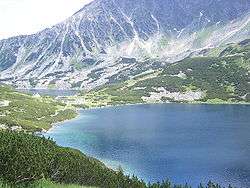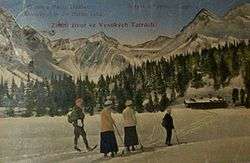High Tatras
| High Tatras | |
|---|---|
| Vysoké Tatry | |
 Panorama of High Tatras. Peaks, from left to right: Gerlachovský štít, Batizovský štít, Kačací štít, Končistá, Gánok, Vysoká, and Rysy | |
| Highest point | |
| Peak | Gerlachovský štít |
| Elevation | 2,655 m (8,711 ft) |
| Coordinates | 49°10′N 20°08′E / 49.167°N 20.133°ECoordinates: 49°10′N 20°08′E / 49.167°N 20.133°E |
| Geography | |
 High Tatras Location of the High Tatras in Slovakia and Poland | |
| Countries | Slovakia and Poland |
| States | Prešov Region and Lesser Poland Voivodeship |
| Regions | Tatra National Park—Tatranský národný park (Slovakia) and Tatra National Park—Tatrzański Park Narodowy (Poland) |
| Parent range | Eastern Tatras |
The High Tatras or High Tatra Mountains (Slovak and Czech: Vysoké Tatry, Polish: Tatry Wysokie, Hungarian: Magas -Tátra), are a mountain range along the border of northern Slovakia in the Prešov Region, and southern Poland in the Lesser Poland Voivodeship. They are a range of the Tatra Mountains chain.
Description
The mountain range borders Belianske Tatras to the east, Podtatranská kotlina to the south and Western Tatras to the west. The major part and all the highest peaks of the mountains are situated in Slovakia. The highest peak is Gerlachovský štít, at 2,655 metres (8,711 ft).
Natural history
The High Tatras, having 29 peaks over 2,500 metres (8,200 ft) AMSL are, with the Southern Carpathians, the only mountain ranges with an alpine character and habitats in the entire 1,200 kilometres (750 mi) length of the Carpathian Mountains system. The first European cross-border national park was founded here—Tatra National Park—with Tatra National Park (Tatranský národný park) in Slovakia in 1948, and Tatra National Park (Tatrzański Park Narodowy) in Poland in 1954. The adjacent parks protect UNESCO's trans-border Tatra Biosphere Reserve.[1]
- Fauna
Many rare and endemic animals and plant species are native to the High Tatras. They include the Tatras' endemic goat-antelope and critically endangered species, the Tatra chamois (Rupicapra rupicapra tatrica). Large predators include Eurasian brown bear, Eurasian lynx, marten, wolf and fox. The Alpine marmot is common in the range.
- Flora
Flora of the High Tatras includes: the endemic Tatra scurvy-grass (Cochlearia tatrae), yellow mountain saxifrage (Saxifraga aizoides), ground covering net-leaved willow (Salix reticulata), Norway spruce (Picea abies), Swiss pine (Pinus cembra), and European larch (Larix decidua).
Peaks
Highest peaks

The 15 highest peaks of the High Tatras—all located in Slovakia—are:[2]
| Peak | Elevation (m|ft) | |
|---|---|---|
| Gerlachovský štít | 2,655 | 8,711 |
| Gerlachovská veža | 2,642 | 8,668 |
| Lomnický štít | 2,633 | 8,638 |
| Ľadový štít | 2,627 | 8,619 |
| Pyšný štít | 2,623 | 8,605 |
| Zadný Gerlach | 2,616 | 8,583 |
| Lavínový štít | 2,606 | 8,550 |
| Malý Ľadový štít | 2,602 | 8,537 |
| Kotlový štít | 2,601 | 8,533 |
| Lavínová veža | 2,600 | 8,530 |
| Malý Pyšný štít | 2,591 | 8,501 |
| Veľká Litvorová veža | 2,581 | 8 468 |
| Strapatá veža | 2,565 | 8,415 |
| Kežmarský štít | 2,556 | 8,386 |
| Vysoká | 2,547 | 8,356 |
Other notable peaks
- Kriváň, 2494 meters, Slovakia's "most beautiful mountain"
- Rysy, the popular Polish−Slovak summit border crossing. Rysy has three peaks: the middle at 2,503 meters; the north-western at 2,499 meters; and the south-eastern at 2,473 meters. The north-western peak is the highest point of Poland.
- Slavkovský štít, 2452 meters tall, within the Tatra National Park, Slovakia

Mountain lakes


Major lakes
- Morskie Oko - 1,395 m, 51 m deep.
- Czarny Staw pod Rysami - 1,583 m, 76 m deep.
- Wielki Staw Polski - 1,664 m, 79 m deep.
- Štrbské pleso - 1,347 m, 20 m deep.
- Veľké Hincovo pleso - 1,945 m, 54 m deep.
- Popradské pleso - 1,494 m, 17 m deep.
Other lakes
- Zmrzlé pleso
- Ťažké pleso
- Ľadové pleso
- Batizovské pleso
- Veľké Spišské pleso - 2,019 m, 10 m deep.
- Veľké Žabie pleso (Mengusovské) - 1,921 m, 7 m deep
- Vysne Bielovoeske Zabie pleso - 1,699 m, 25 m deep.
- Nizne Bielovodske Zabie pleso - 1,675 m, 21 m deep.
- Czarny Staw Gąsienicowy - 1,624 m, 51 m deep.


Culture
The area is well known for winter sports. Ski resorts include Štrbské pleso, Starý Smokovec and Tatranská Lomnica in Slovakia, and Zakopane in Poland. The town of Poprad is the gateway to the Slovak Tatra resorts.
- People
The Górale people ("highlanders"), a group of indigenous people with a distinctive traditional culture, are of the High Tatras and other mountain ranges and valleys in the Tatra Mountains region.
Ludwig Greiner identified Gerlachovský štít (Gerlachovský Peak) (2,665 metres (8,743 ft)) as the highest summit of the Tatra Mountains, and the entire Carpathian Mountains system. It is also the highest point of Slovakia.
- Places and services
- Vysoké Tatry (town)
- Orla Perć — tourist mountain path/trail.
- Tatra Volunteer Search and Rescue (Poland)
- Mountain Rescue Service (Slovakia)
See also
References
- ↑ UNESCO preserves
- ↑ "Najvyššie pohoria Slovenska (Highest mountain ranges in Slovakia)" (in Slovak). Matej Lednár. 2003. Retrieved June 2, 2007.
- "The Tatras: High, Western, Bela's" (1:50,000 hiking map); BBKart/Marco Polo; 2005.
External links
| Wikimedia Commons has media related to High Tatra Mountains. |
- UNESCO — Natural Reserves of Tatras Mountains
- Tatry.org: Tatry Open Directory
- Tatry.sk: Official town of High Tatry website
- TldTatry.sk: Tatra Cable Railways
- Summitpost.org: High Tatra Mountains
- High Tatra Mountains visualized in 3D
Images
- VysokeTatry.com— various maps of the High Tatras
- Butkaj.com: photos of villages in the High Tatras — after the 2004 storm calamity.
|